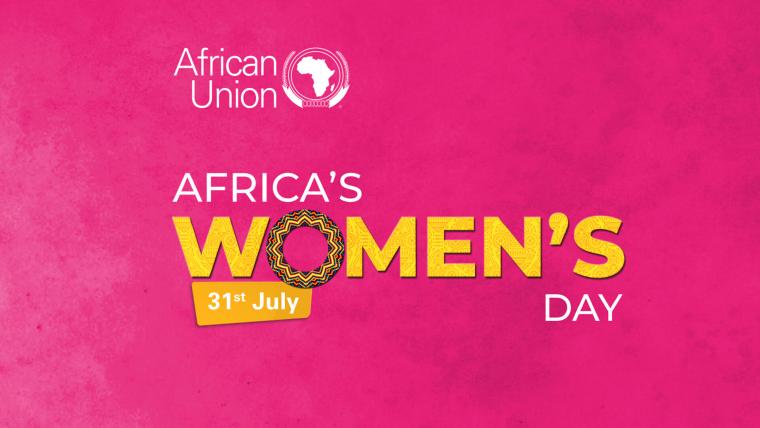Africa’s Women’s Day 2021: Celebrating African women in the Cultural and Creative Industries
Africa’s Women’s Day 2021: Celebrating African women in the Cultural and Creative Industries

The African Union (AU) recognises the role arts, culture and heritage can play as catalysts for the socio-economic development and integration of the African continent through the creative industries and on the 31st of July 2021, Africa commemorated Africa’s Women’s Day under the theme “African Women in Arts, Culture and Heritage”, in line with the AU theme for 2021 “Year of Arts Culture and Heritage: Levers for the Africa We Want”.
The Africa’s Women’s Day 2021 theme underpinned the commemorative activities on gender equality and empowerment and provided women in the Cultural and Creative Industries (CCIs) an opportunity to rally support and advance actions towards the implementation of commitments on gender equality and women’s empowerment in the creative economy sector to ensure resources and factors of production are equally distribute so as to promote the productivity and growth of women and enable them to maximise their potential through social and/or economic activities in the sector.
The 2021 theme draws inspiration in Aspiration 5 of Agenda 2063, which envisages:
- An Africa with a strong cultural identity, values and ethics;
- Strengthening the African cultural identity, values and ethics as a critical factor for Africa’s emergence on the global stage.
- African people imbued with a sense of their fundamental cultural unity, a sense of a common destiny and African identity and pan-African consciousness.
- An Africa where work is a key ethic and value, where women play an important role, and in which traditional and religious leaders, including the youth as drivers of change is recognized.
Cultural and creative industries including: visual arts, cinema and audio visual, music, literature, African gastronomy and cuisine; arts and crafts, fashion and design will be given greater visibility in line with the theme of the year. The commemoration was also aligned to the declaration of years 2020 to 2030 as the Decade of African Women’s Financial and Economic Inclusion. The overall goal of the Decade of Women’s Financial and Economic Inclusion is that every women must be able to work, be paid and participate in the economy of her country. This will involve examining the regulatory, legislative and policy context to determine the changes needed to foster the financial inclusion of women and to assist financial institutions in adopting approaches tailored to women as a separate market segment, as well as their participation in key economic sectors, including the creative and cultural Industries.
In addition to the thematic activities of the day, an Intergenerational Dialogue bringing together leaders and youth was convened under the theme “Building the Africa We Want: The Role of Youth in Fostering Gender Equality” with discussions emphasising the need to move from commitment to action, to ensure the quest for gender equality and women’s empowerment becomes a reality for African women and girls. The African Union Commission (AUC) Deputy Chairperson, Dr. Monique Nsanzabaganwa observed that African women are at the core of Africa’s development and the achievement of Agenda 2063, stating “it has been the African Union’s responsibility to ensure these three foundational issues: Promoting gender equality, Women’s human rights and Women’s empowerment; are constantly prioritised in the work of the African Union Commission and across the African Union member states. Within the Commission we are committed to achieving 35% gender parity and prioritising the employment of youth for certain positions”. Through the implementation of the AU Gender Parity Project, the AU aims at realising a 50/50 representation of men and women in the AU workforce at all levels, and 35% Youth among the AU workforce Union by 2025.
With a similar call to action for member states support the inclusion of women and girls in all spheres of the life, the AU Special Envoy on Women, Peace and Security, Bineta Diop, highlighted the disproportionate impact of COVID-19 pandemic on women and girls. “Violence against women and girls has become a devastating pandemic on its own, which threatens women and girls’ development and their ability to reach their potential. The youth must be at the forefront of the battle against Gender-Based Violence (GBV) and harmful practices.”
Prof. Sarah Anyang Agbor, AUC Commissioner for Education, Science, Technology and Innovation (ESTI) elaborated on the 1 Million By 2021 initiative and added that the Commission had an array of youth focused programs such as; the African Union Youth Volunteer Corps Program, Young African Women Leadership Network, Continental Education Skills for Africa, and a Specialised Technical Community among others.
In addition to the 2021 theme of the year being dedicated to the creative economy sector in line with Agenda 2063, the AU has included culture in all major development blue prints, such as the Lagos Plan of Action 1980-2000 and has adopted various legal instruments pertaining to culture including the Cultural Charter for Africa (1978) the Charter for African Cultural Renaissance (2006), the Statute of the African Audio-Visual and Cinema Commission (2019) and the AU Model Law on the Protection of Cultural Property and Heritage (2018). Furthermore, the AU Strategy for Gender Equality and Women’s Empowerment (GEWE) is a framework that aims to strengthen women's agency in Africa and ensure that women's voices are amplified and their concerns fully addressed through, among others, effective implementation of legislation and proper financing of gender equality work.
Learn more about Africa’s Women’s Day and access the albums and blog on https://au.int/en/africa-womens-day-2021



